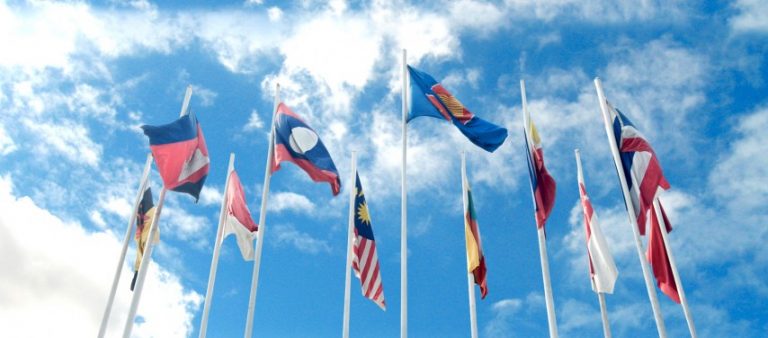1. Ministers responsible for the environment and their representatives from ASEAN Member States met in Bandar Seri Begawan, Brunei Darussalam on 13 October 2010 on the occasion of the 6th Meeting of the Conference of the Parties to the ASEAN Agreement on Transboundary Haze Pollution and the 12th Informal ASEAN Ministerial Meeting on the Environment. The Ministers reviewed on-going programmes on the environment to promote future regional cooperation on the environment.
2. The Ministers reviewed national, sub-regional and regional activities to address land and forest fires in the region and its associated transboundary haze pollution. The Ministers welcomed the substantive progress in the implementation of the Work Programme of the ASEAN Agreement on Transboundary Haze Pollution, including concrete on-the-ground activities, the implementation of Indonesia’s Plan of Action, and bilateral collaborations between Malaysia and Indonesia in Riau Province and between Singapore and Indonesia in Jambi Province, and activities in the Mekong Sub-region, including the bilateral cooperation between Thailand with Lao PDR and Myanmar. The Ministers noted that the efforts by ASEAN Member States in preventing and controlling land and forest fires have helped to reduce transboundary haze pollution during the last few years.
3. In the northern ASEAN region, with the transition to the Northeast Monsoon, the rainy season is expected to gradually ease which may lead to escalation of hotspot activities towards the end of the year. For the southern ASEAN region, from October to November 2010, the Inter-Monsoon season bringing shower activities will help to subdue hotspot activities. However, periods of dry conditions may occur, and hence the ASEAN Member States pledged to remain vigilant and continuously monitor and implement haze preventive activities.
4. The Ministers endorsed the development of Fire Danger Rating System (FDRS) for the ASEAN region as a tool to undertake monitoring and preventive actions to address the outbreak of fires. The FDRS which provides assessment of ignition potential, occurrence, and spread of fires based on weather, fuel and soil conditions, will be a useful complement to the weather and hotspot monitoring being done by the ASEAN Specialised Meteorological Centre (ASMC).
5. The Ministers noted the progress of the implementation of the project on Rehabilitation and Sustainable Use of Peatland Forests in Southeast Asia, including the recent Workshop on Options for Carbon Financing to Support Peatland Management held in October 2010 in Riau, Indonesia. The Ministers encouraged international and regional collaborative partnerships to support this Project as it seeks to address climate change and biodiversity loss through mitigation of land and forest fires.
6. The Ministers reiterated the importance of reaching agreement on climate change issues at COP16/CMP6 in Cancun, Mexico, based on the 2007 Bali Action Plan and Bali Road Map and taking into account the Copenhagen Accord. The Ministers expressed concern over the slow pace of negotiations, and that many key issues remain unresolved at this late stage. The Ministers noted that ASEAN has collectively highlighted their position towards a positive and equitable outcome at COP16/CMP6, in particular through the ASEAN Leaders’ Statement on Joint Response to Climate Change adopted at the 16th ASEAN Summit. The Ministers agreed that COP16/CMP6 should strive for a legally binding agreement, particularly to limit the increase in average global temperature to below 2 degrees Celsius above the pre-industrial level, with developed countries continuing to take the lead by making more ambitious commitments and setting out specific and binding targets to reduce greenhouse gas emissions, and supporting developing countries with adequate, predictable and sustainable financial resources, transfer of technology, as well as capacity enhancement to enable adaptation efforts and nationally appropriate mitigation actions by developing countries through effective and new institutional arrangements, among others.
7. The Ministers agreed on the need to have pre-consultation meetings among ASEAN Member States to strengthen cooperation and coordination among ASEAN Member States in preparation of the upcoming 16th session of the Conference of the Parties to the UNFCCC and the 6th session of the Conference of the Parties serving as the Meeting of the Parties to the Kyoto Protocol to be held in November-December 2010 in Cancun, Mexico.
8. The Ministers noted the implementation of ASEAN Strategic Plan on Water Resources Management in the areas of water resources demand management learning forum for irrigation, river classification system, ASEAN water data management and reporting system design, and the risks and impacts from extreme events of floods and droughts in ASEAN Countries.
9. The Ministers noted the progress of the implementation of the ASEAN Environmental Education Plan 2008-2012, in particular the successful conduct of the ASEAN Plus Three Youth Environment Forum 2010: Creating a Climate for Change on 22-25 April 2010 in Brunei Darussalam and the ASEAN Plus Three Leadership Programme on Sustainable Production and Consumption on 7-8 October 2010 in Manila, Philippines. The Ministers also endorsed the proposal to conduct the ASEAN Environmentally Sustainable Development Film Festival with the theme ‘Change the Climate Change’ at the sideline of the 13th Informal ASEAN Ministerial Meeting on the Environment in 2011 in Cambodia.
10. The ASEAN Ministers will meet their counterparts from the People’s Republic of China, Japan and Republic of Korea at the 9th ASEAN Plus Three Environment Ministers Meeting on 14 October 2010 to exchange views on global environmental issues, and to discuss activities on areas such as biodiversity, climate change, environmental education, water resources management, promotion of environmentally sound technology and cleaner production, and solid waste and hazardous waste management.
11. The ASEAN Ministers will also meet their counterparts from Australia, the People’s Republic of China, Japan, India, New Zealand, and Republic of Korea at the 2nd East Asia Summit Environment Ministers Meeting on 15 October 2010 to exchange views on environmental cooperation under the framework of East Asia Summit, and to develop proposals on, among others, environmentally sustainable cities in response to climate change and the feasibility of establishing the East Asia Centre for Environmental Education.
